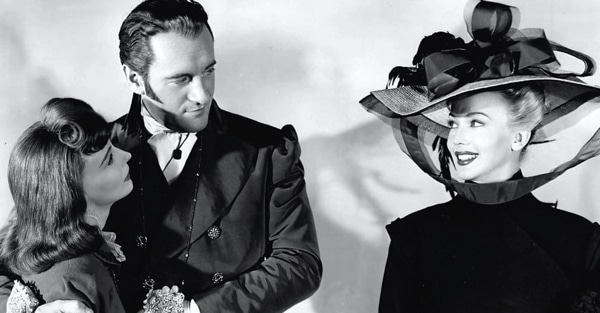

Dir.: Douglas Sirk; Cast: George Sanders, Signe Hasso, Carole Landis, Akim Tamiroff, Alma Kruger, Gene Lockart; USA 1946, 100 min.
Douglas Sirk (1897-1987) started life as Detlef Sierck in Berlin (UFA), before emigrating via France to Los Angeles just before the Second World War. Best known for his florid Hollywood melodramas of the 1950s, Magnificent Obsession and All I Desire, Summer Storm (1944) and A Scandal in Paris (1946) are beasts of another feather and throwbacks to his German career. Scandal is based on the autobiography of Francois Eugene Vidocq, erstwhile criminal who became the Police Chief of Paris. Adapted by Ellis St. Joseph, Vidocq tries his best to camouflage his real past: His father was a wealthy man, and probably the first victim of his criminal son.
In 1775, we meet Vidocq (Sanders) and his sidekick Emile (Tamiroff) on the verge of fleeing prison with the help of a file hidden in a cake. Thanks to a forger, part of Emile’s large criminal family, Vidocq is made a lieutenant in the French army, a perfect foil for stealing jewellery from wealthy women who fall under his spell.
Next on the list is the chanteuse Loretta de Richet (Landis), who is married to Chief of Police Richet (Lockhart). After successfully completing his assignment, Vidocq sets his eyes on the jewels of the de Pierremont family, represented by the Marquise de Pierremont (Kruger) and her daughter Therese (Hasso). But having trousered the gems, Vidocq changes tack after Richet being sacked by the Marquis de Pierremont, his superior. The master thief not only ‘solves’ the case, but also ‘recovers’ the jewels, becoming Richet’s successor, a move that will give him access to the vault of the Paris Bank.
Loretta blackmails Vidoqc, asking him to give up Therese and rekindle their relationship. But this leads to a chain of events culminating in a deadly struggle at a merry-go-round in the woodlands, the exact same place where Therese revealed she knew everything about Vidocq’s shady past.
DoP Eugen Schuftan (1983-1977), a legend who shot Menschen am Sonntag and early Hitchcock features, goes uncredited, with Guy Rose getting the only camerawork mention. Schuftan gives the feature a decisively European look reminiscent of Max Ophuls’ pre-war fare. Hans Eisler’s score echoes this arrestingly stylish look and Hungarian born producer Emeric Pressburger makes up the team whose roots were cultured in the old continent before the rise of fascism.
George Sanders is brilliant as the ambivalent anti-hero, the same goes for Carole Landis who, in one of her scenes as a chanteuse, very much impersonates Marlene Dietrich in Der Blaue Engel. But, alas both actors had a string of unhappy relationships and would go on to commit suicide: Landis in 1948 at the age of twenty-nine and Sanders in 1972, plagued by dementia and depression. Signe Hasso on the other hand never lived up to her billing as Greta Garbo’s successor, living a long and happy life, mainly starring in TV commercials.
Fellow émigré director Edgar Ulmer mentioned Scandal‘s sublime quality unique to Sirk’s oeuvre, that lends an ethereal touch to this romantic drama with is exquisite costumes by Norma (Koch). AS
NOW ON CURZON ONLINE AS PART OF THE COHEN VINTAGE COLLECTION